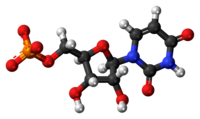Uridine monophosphate
 |
|
 |
|
| Names | |
|---|---|
|
IUPAC name
[(2R,3S,4R,5R)-5-(2,4-Dioxopyrimidin-1-yl)-3,4-dihydroxyoxolan-2-yl]methyl dihydrogen phosphate
|
|
| Other names
Uridylic acid; Uridine 5'-monophosphate; 5'-Uridylic acid; Uridine 5'-phosphate; Uridine phosphate; 5'-UMP; Uridine 5'-phosphoric acid
|
|
| Identifiers | |
|
3D model (Jmol)
|
|
| ChemSpider | |
| ECHA InfoCard | 100.000.371 |
| MeSH | Uridine+monophosphate |
|
PubChem CID
|
|
|
|
|
|
| Properties | |
| C9H13N2O9P | |
| Molar mass | 324.18 g·mol−1 |
| Melting point | 202 °C (396 °F; 475 K) (decomposes) |
| good, also in methanol | |
| Acidity (pKa) | 1.0, 6.4, 9.5 |
|
Except where otherwise noted, data are given for materials in their standard state (at 25 °C [77 °F], 100 kPa).
|
|
|
|
|
| Infobox references | |
Uridine monophosphate (UMP), also known as 5′-uridylic acid (conjugate base uridylate), is a nucleotide that is used as a monomer in RNA. It is an ester of phosphoric acid with the nucleoside uridine. UMP consists of the phosphate group, the pentose sugar ribose, and the nucleobase uracil; hence, it is a ribonucleoside monophosphate. As a substituent or radical its name takes the form of the prefix uridylyl-. The deoxy form is abbreviated dUMP.
Uridine monophosphate is formed from Orotidine 5'-monophosphate (orotidylic acid) in a decarboxylation reaction catalyzed by the enzyme orotidylate decarboxylase. Uncatalyzed, the decarboxylation reaction is extremely slow (estimated to occur on average one time per 78 million years). Adequately catalyzed, the reaction takes place once per second, an increase of 1017-fold.
In humans, the orotidylate decarboxylase function is carried out by the protein UMP synthase. Defective UMP synthase can result in orotic aciduria, a metabolic disorder.
In a study, gerbils fed a combination of uridine monophosphate, choline, and docosahexaenoic acid (DHA) were found to have significantly improved performance in running mazes over those not fed the supplements, implying an increase in cognitive function.
...
Wikipedia
